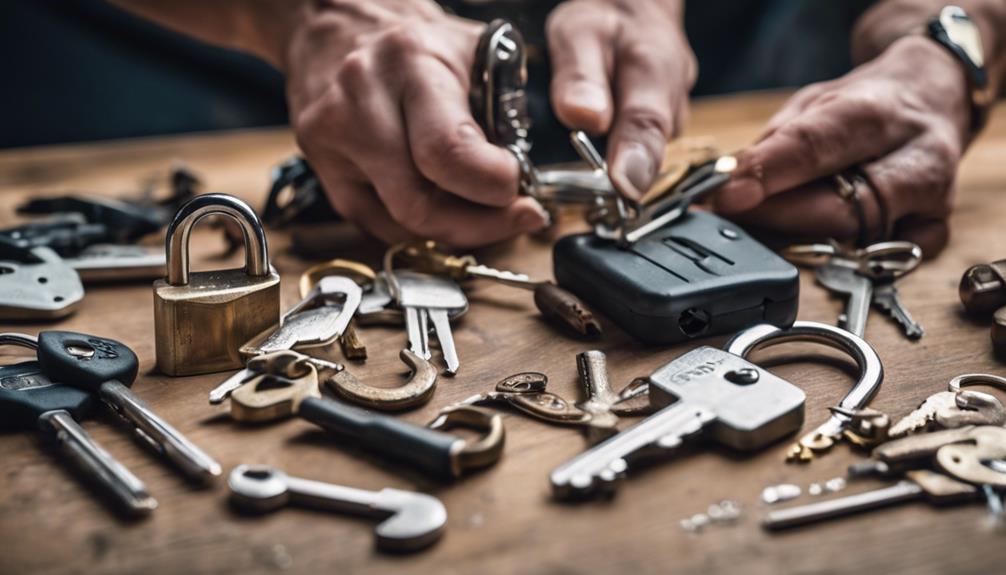Emergency lock re-keying is vital for protecting your home or business when facing unexpected situations. If you've lost keys, endured a break-in, or had untrustworthy tenants, you need immediate re-keying. This process guarantees old keys won't work, preventing unauthorized entry. A skilled locksmith can typically complete this in under an hour, providing you with peace of mind. You should also consider when to re-key, like after moving or when an employee leaves. Understanding costs and preparing for the locksmith's visit can smoothen the process. Discover key insights that can help you stay one step ahead in securing your space.
Key Takeaways
- Emergency re-keying is essential after lost keys, break-ins, or tenant changes to ensure security and prevent unauthorized access.
- Professional locksmiths can provide rapid, same-day re-keying services tailored to your specific security needs.
- The re-keying process involves assessing locks, changing internal pins, and testing with a new key, typically completed in under an hour.
- Costs for re-keying usually range from $20 to $50 per lock, with additional fees for extra keys or service charges.
- Post-re-keying, update access codes and educate your household on security measures to maintain ongoing safety.
Importance of Emergency Re-keying
When it comes to your home or business security, emergency re-keying is vital. You can't predict when a security threat will arise, whether it's losing a key, experiencing a break-in, or dealing with an untrustworthy tenant. In these situations, immediate lock re-keying is essential to protect your property and the people within it.
Additionally, understanding lock re-keying helps you grasp the importance of this service in maintaining security.
Urgent rekeying solutions offer you peace of mind, allowing you to regain control over who's access to your space. By re-keying your locks, you guarantee that old keys no longer work, effectively eliminating any unauthorized entry. This proactive approach not only safeguards your belongings but also reassures those you serve that you prioritize their safety.
When you need rapid assistance, turn to professionals who specialize in emergency lock rekeying. They'll respond promptly, evaluating your situation and providing tailored solutions to meet your needs.
Common Scenarios for Re-keying
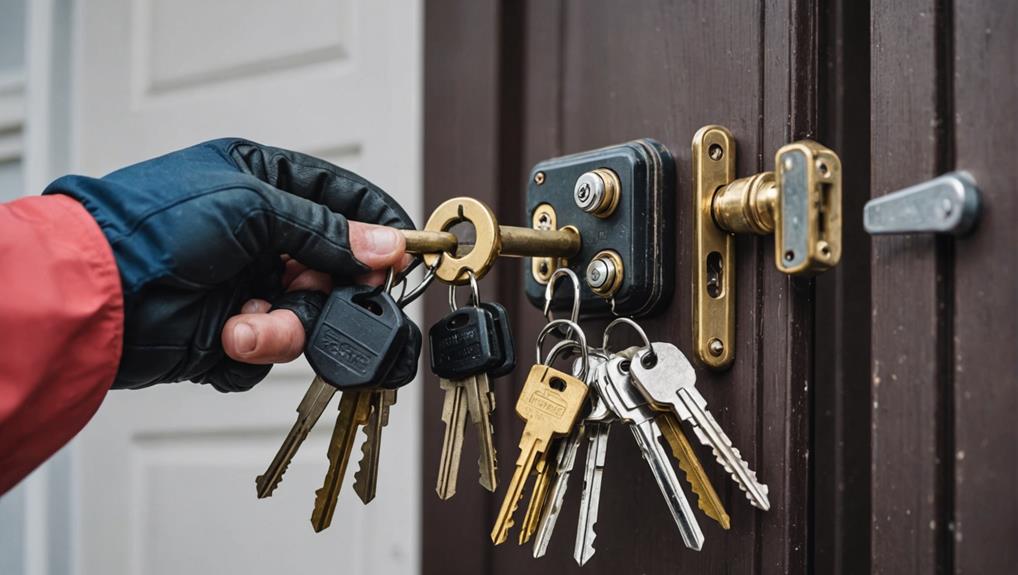
There are several common scenarios where re-keying your locks becomes necessary.
If you've lost your keys, moved to a new place, or had an ex-employee or roommate leave, it's vital to secure your space.
Additionally, many landlords are legally required to re-key locks after a tenant moves out to guarantee the safety of future occupants legal obligations for landlords.
Taking action in these situations can help protect your home or business from unauthorized access.
Lost or Stolen Keys
If you've lost your keys or had them stolen, re-keying your locks is an essential step to assure your security. You might feel anxious about the situation, but taking action swiftly can help restore your peace of mind.
When to rekey in emergency situations like this is clear; you can't afford to wait. Consider what could happen if someone finds your keys or intends to use them maliciously. By re-keying your locks, you assure that only you have access to your home or business.
Emergency locksmith services are available to assist you quickly, providing the expertise you need to secure your property without delay. When you call an emergency locksmith, they'll evaluate your situation and recommend the best course of action.
Often, they'll arrive promptly, ready to re-key your locks on-site. This proactive approach protects your belongings and enhances your overall safety. Remember, it's better to be safe than sorry, so don't hesitate to reach out for help.
Taking these steps not only protects you but also gives you the confidence to move forward after such an unsettling experience.
Recent Move or Relocation
Moving into a new home or office can be an exciting yet overwhelming experience, and one of the first things you should consider is re-keying your locks.
You want your space to feel safe and secure, and re-keying guarantees that only you and your trusted individuals have access. When you move, you can't be certain who may still have a key to your property—previous tenants, real estate agents, or maintenance staff.
Re-keying is a simple process that alters your locks, rendering old keys useless while providing you with new ones.
It's a proactive step that gives you peace of mind. This is especially important if you're moving into a shared living situation or a commercial space where multiple people may have had access previously.
Ex-Employee or Roommate Leaving
When an ex-employee or roommate leaves, it's vital to assess your security. You might've trusted them, but circumstances can change quickly. It's important to re-evaluate who's access to your space and sensitive information. Even if you'd a positive relationship, you can't assume they won't misuse their old keys or codes.
Start by taking inventory of any keys that were given out. If the person had a key to your home or office, re-keying your locks is a wise choice. This simple action can prevent unauthorized access and give you peace of mind.
Consider the nature of your shared spaces. If you shared an office, confidential documents could be at risk. Re-keying protects your assets and guarantees that your environment remains secure.
Additionally, think about changing any access codes to security systems or shared online accounts. This step is just as important as changing physical locks.
Taking these precautions not only safeguards your property but also demonstrates a commitment to maintaining a secure environment for everyone involved. Your proactive steps can help foster a safe space for you and those you serve.
Signs You Need Re-keying
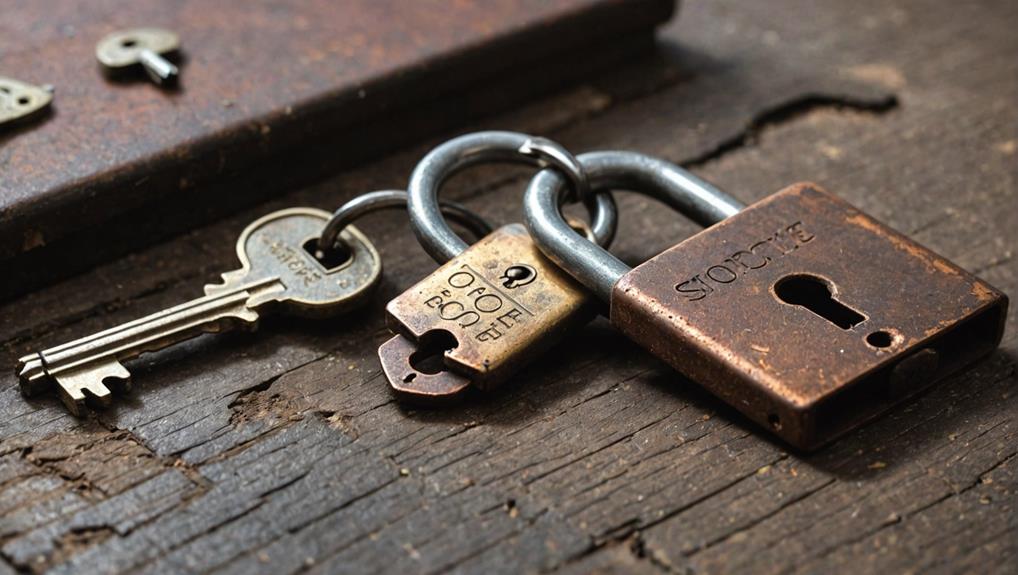
If you've lost your keys or had them stolen, it's vital to contemplate re-keying your locks.
This process can greatly enhance your home's security, especially if you're unsure who might've access to your previous keys.
Recent changes to your property, like a new roommate or tenant, can also signal the need for this important security measure, as the importance of re-keying locks can't be overstated.
Staying proactive about your lock system can help protect your home and belongings.
Lost or Stolen Keys
Losing your keys or having them stolen can be a nerve-wracking experience, and it often leaves you feeling vulnerable. It's crucial to recognize the signs that indicate you need to re-key your locks. Here are some situations to ponder:
| Situation | Action Needed | Reason |
|---|---|---|
| Keys are lost | Re-key immediately | Prevent unauthorized access |
| Keys are stolen | Re-key as soon as possible | Safeguard your property |
| You've lent keys out | Think about re-keying | Protect against forgotten returns |
| You notice unauthorized access | Re-key without delay | Guarantee your safety |
| Suspicion of key duplication | Re-key to eliminate risk | Maintain control over entry |
If you find yourself in any of these situations, don't hesitate to take action. Re-keying not only restores your peace of mind but also protects those you serve, be it your family, friends, or community. Remember, your safety is paramount, and taking proactive steps can make all the difference.
Recent Property Changes
Changes in property ownership or occupancy can create significant security concerns. Whether you've sold your home, welcomed new tenants, or experienced a shift in your living situation, it's crucial to reflect on re-keying your locks.
Here are three signs that it might be time to take action:
- New Occupants: If you've just moved in or have new tenants, it's wise to verify that no one else has access to your space. Previous owners or their friends might still have keys.
- Loss of Control: If you've lent out keys or if key copies have been made without your knowledge, you could be vulnerable. Re-keying eliminates the uncertainty.
- Past Relationships: After a breakup or falling out with a roommate, feelings can run high. Re-keying your locks can provide peace of mind and security.
In each of these situations, you're not just safeguarding your property; you're also prioritizing the safety of those you serve.
Taking proactive steps to re-key your locks can restore your sense of security and protect your community.
Don't hesitate to reach out for professional assistance when needed.
Benefits of Quick Re-keying
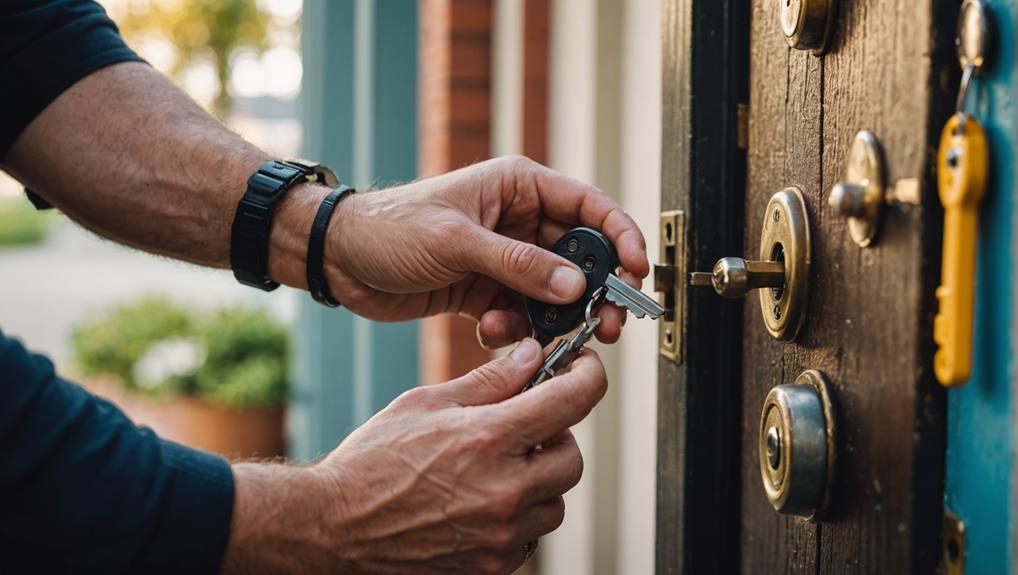
When you've misplaced your keys or experienced a security breach, quick re-keying offers peace of mind and immediate protection. This service allows you to regain control over your property swiftly, ensuring that unauthorized individuals can't access your space. By re-keying your locks, you can feel secure knowing that only you and your trusted individuals have the keys.
Another significant benefit of quick re-keying is its affordability and efficiency compared to complete lock replacement. You save time and money while still enhancing your home or business's security. Plus, re-keying is often a same-day service, meaning you won't have to wait long to feel safe again.
Additionally, quick re-keying can strengthen your commitment to the safety of those you serve. Whether it's your family, employees, or clients, demonstrating that you prioritize their security builds trust and shows that you care.
Ultimately, quick re-keying is a proactive step in safeguarding your environment. It allows you to bounce back from unexpected situations without delay, ensuring that you can continue to serve others with confidence and peace of mind.
How the Re-keying Process Works
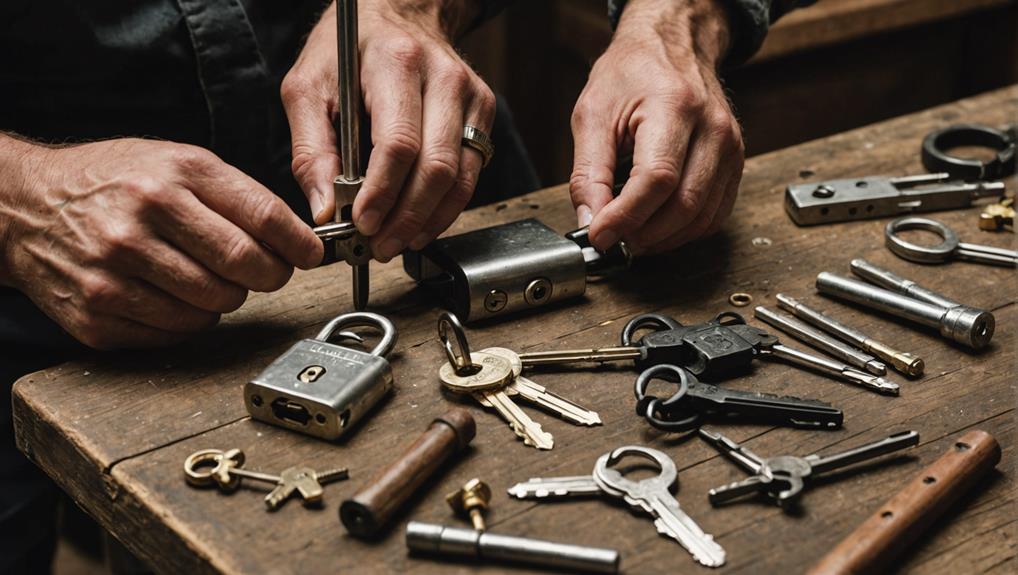
Re-keying your locks involves a straightforward yet effective process that can quickly restore your security.
Whether you've lost your keys or want to enhance safety, re-keying is a great solution. In fact, mastering lock re-keying can provide you with the skills to tackle any challenges that may arise during the process.
Here's how it typically works:
- Assessment: A locksmith will examine your existing locks to determine if they can be re-keyed. This step guarantees that your locks are in good condition and suitable for the process.
- Removal: The locksmith removes the lock cylinder from your door. This allows them access to the internal mechanisms that need adjustment.
- Re-keying: They'll change the pins inside the cylinder to match a new key. This step is vital, as it assures that only your new key can operate the lock.
After these steps, your locksmith will reassemble the lock and test it with the new key.
It's a quick process that can usually be completed in under an hour, giving you peace of mind and a renewed sense of security.
Choosing the Right Locksmith
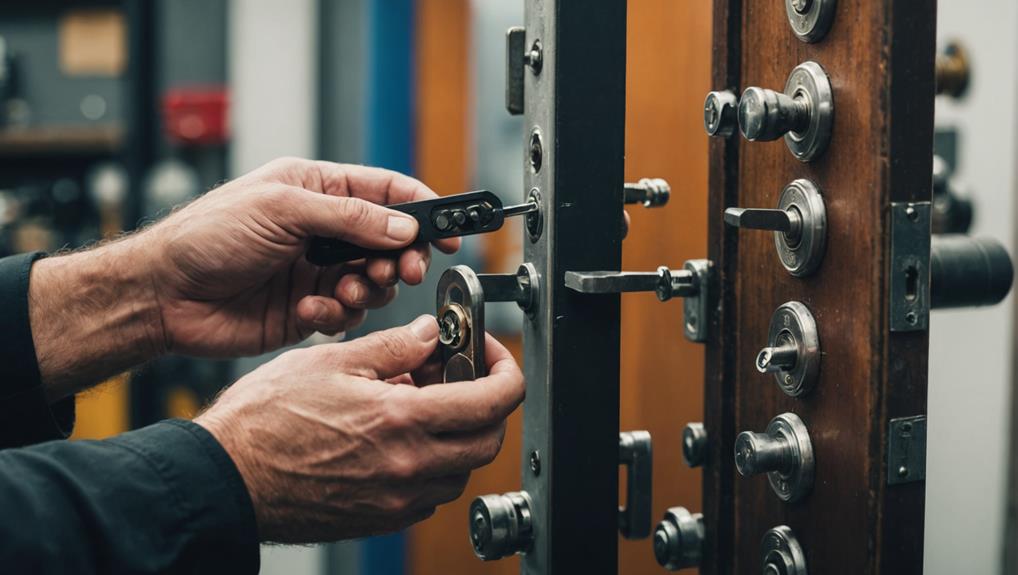
Selecting the right locksmith is essential for ensuring your home's security and the effectiveness of the re-keying process. You want someone trustworthy and skilled, so take the time to research your options. Start by asking friends or family for recommendations. Online reviews can also provide insights into a locksmith's reliability.
Here's a simple table to help you evaluate potential locksmiths:
| Criteria | What to Look For | Questions to Ask |
|---|---|---|
| Experience | Years in business and expertise | How long have you been a locksmith? |
| Licensing & Insurance | Valid license and liability coverage | Are you licensed and insured? |
| Customer Service | Responsiveness and professionalism | How do you handle customer complaints? |
| Pricing | Clear estimates and no hidden fees | Can you provide a written estimate? |
| Availability | 24/7 service for emergencies | Are you available after hours? |
Preparing for the Locksmith Visit
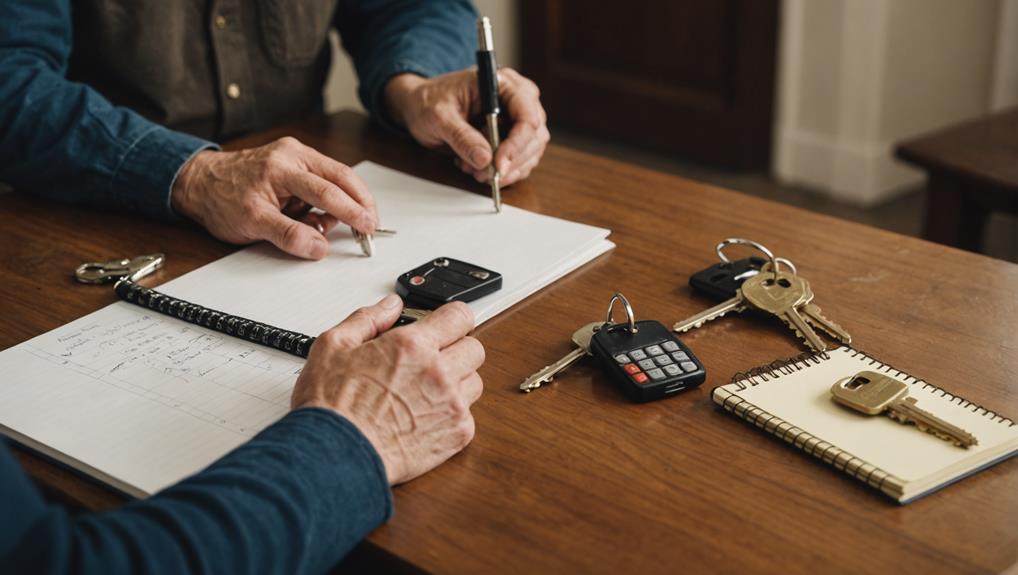
To guarantee a smooth locksmith visit, it's important to prepare ahead of time. Taking a few simple steps will make certain that you and the locksmith can focus on what matters most—securing your space efficiently. In cases of emergency lock re-keying, knowing when to call a professional locksmith for help can make all the difference.
Explore the scenarios where hiring a professional is the best choice.
- Gather Necessary Information: Before the locksmith arrives, collect details about your locks, including the brand and any special features. This information can help the locksmith assess the situation quickly.
- Clear the Area: Make certain the area around your door is free of obstacles. This not only makes the locksmith's job easier but also shows your respect for their time and expertise.
- Be Ready to Communicate: Prepare to discuss your specific needs and any concerns you have. Clear communication helps the locksmith understand your situation and recommend the best solutions.
With these preparations, you'll create an environment that allows the locksmith to work efficiently.
Being proactive not only saves time but also helps you feel more confident in the process. Ultimately, a little preparation goes a long way in making sure your home remains a safe haven.
Costs Associated With Re-Keying
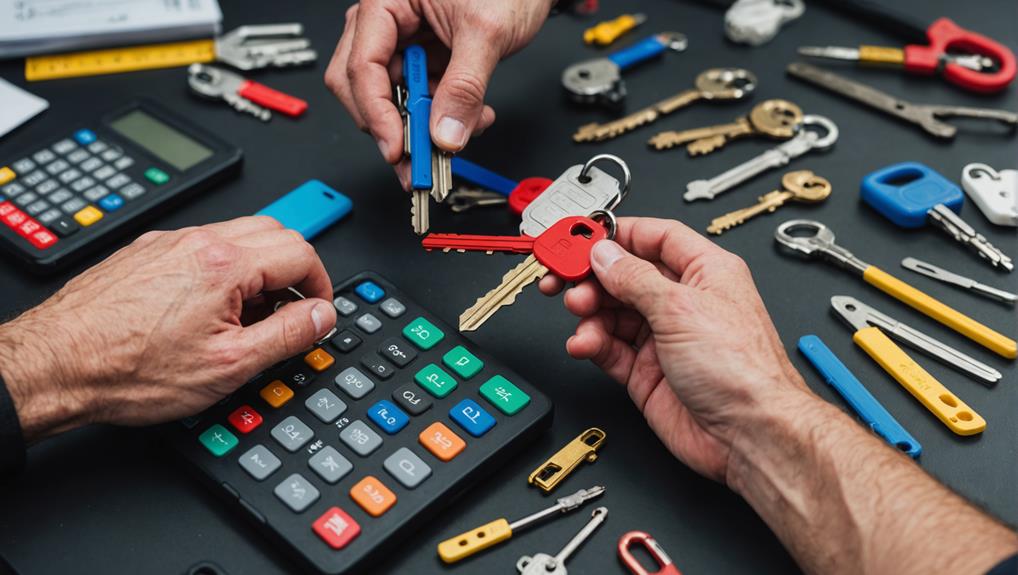
When you decide to re-key your locks, it's essential to understand the costs involved to avoid any surprises. Typically, the price for re-keying can range from $20 to $50 per lock, depending on the type of lock and the complexity of the job.
If you have high-security locks or specialized systems, the cost may be higher, often reaching up to $100 or more. It's also important to note that understanding lock re-keying costs can help you make informed decisions about whether to go DIY or hire a professional.
You should also consider additional service fees charged by the locksmith. Some professionals may include a trip charge, which can vary based on your location.
If your locks require new keys, expect to pay extra for each key made, usually around $2 to $5.
If you're looking to re-key multiple locks, inquire about any package deals or discounts to help you save.
While it might be tempting to handle re-keying yourself, hiring a qualified locksmith guarantees the job's done correctly and safely, ultimately saving you money in the long run.
Preventive Measures After Re-keying
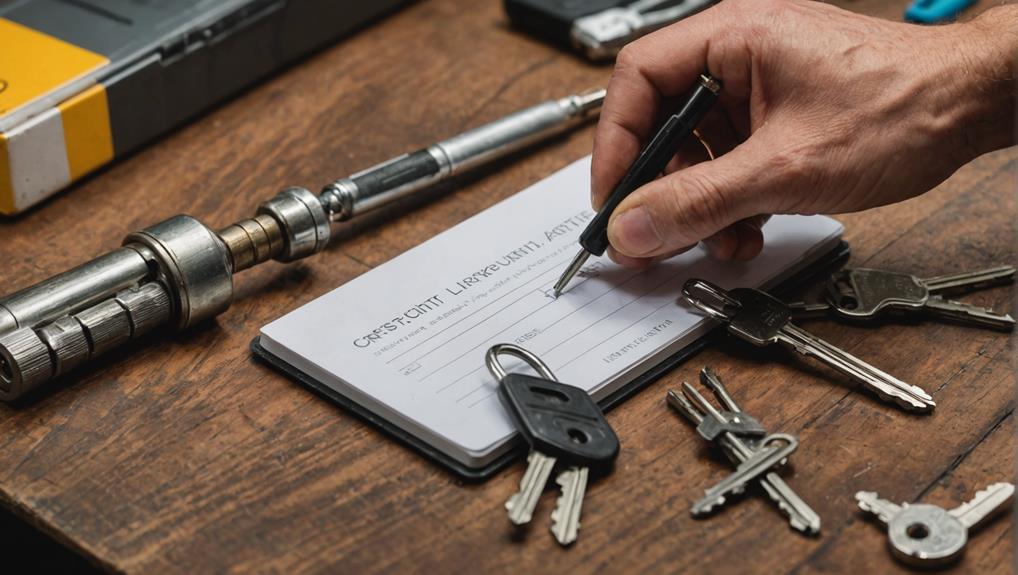
After re-keying your locks, taking preventive measures can enhance your security and guarantee your investment is protected.
Here are some essential steps you can take:
- Change Your Access Codes: If you have a digital lock or security system, update your access codes. This prevents anyone who might've had previous access from getting in.
- Educate Your Family: Make sure everyone in your household knows the importance of lock security. Teach them not to share keys with others and to be vigilant about who they let into your home.
- Regularly Inspect Your Locks: Set a schedule to check your locks regularly. Look for wear and tear, and make sure they're functioning properly.
If you notice any issues, address them immediately.
Frequently Asked Questions
Can I Re-Key My Locks Myself?
Yes, you can re-key your locks yourself if you have the right tools and a bit of know-how.
First, purchase a re-keying kit compatible with your lock type. Follow the instructions carefully to remove the cylinder, replace the pins, and reassemble everything.
It's a rewarding task that can save you money while enhancing your security. Just make sure you're patient, as getting it right takes a little practice!
How Often Should I Consider Re-Keying My Locks?
You should consider re-keying your locks whenever you move into a new home, lose a key, or experience a security breach.
It's also wise to re-key every few years to maintain a high level of security.
If you're unsure about who's access to your keys, it's better to be safe than sorry.
Regularly evaluating your lock security can help keep your home and loved ones safe from potential threats.
What Types of Locks Can Be Re-Keyed?
You can re-key several types of locks, including pin tumbler locks, which are common in residential settings.
Deadbolts are another type that can easily be re-keyed, enhancing your home's security.
Additionally, some electronic locks allow for re-keying to maintain access control.
It's a quick and cost-effective way to guarantee your security without replacing the entire lock.
Just consult a locksmith to find the best option for your specific needs.
Is Re-Keying More Secure Than Changing Locks?
Did you know that about 70% of burglaries happen through unlatched doors?
When you re-key your locks, you're enhancing your security without the need for a complete replacement.
While changing locks can offer fresh protection, re-keying allows you to keep the same hardware, saving you time and money.
It's a quick way to guarantee your loved ones are safe, especially when you've lost a key or moved into a new space.
Will Re-Keying Affect My Existing Keys?
Re-keying your locks will definitely affect your existing keys.
When you re-key, the lock's internal mechanism changes, rendering your old keys useless. This process creates a new key that fits the re-keyed lock.
If you want to maintain access for others, you'll need to provide them with the new keys after the re-keying.
It's a great way to enhance security while ensuring only those you trust can access your space.
Conclusion
In the grand scheme of home security, re-keying your locks is like giving your space a fresh start. It's a simple step that can open the door to peace of mind, especially in uncertain times. By taking action now, you're not just protecting your belongings; you're ensuring your sanctuary remains just that—a sanctuary. So, don't hesitate to reach out to a trusted locksmith and embrace the newfound comfort that comes with a secure home.

